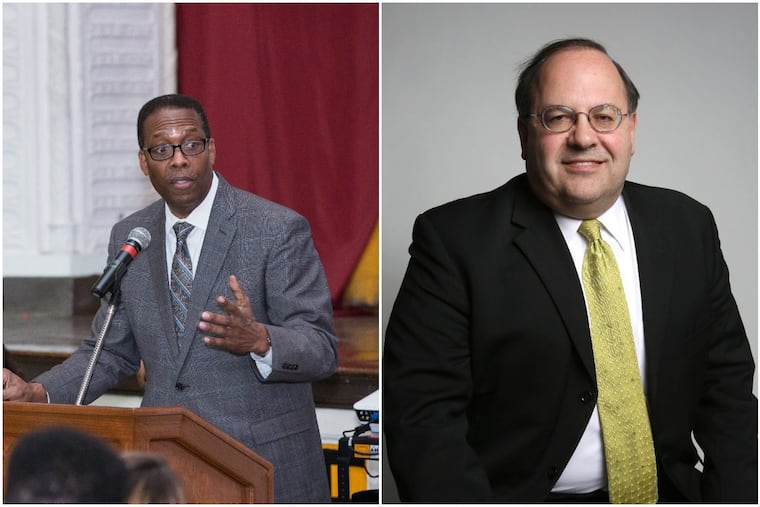Time for an honest discussion about fair taxation in Philly | Darrell L. Clarke
The City erroneously reports that nearly $400 million in taxes are owed by delinquent property owners. This inaccurate figure has already prompted Allan Domb, to introduce legislation authorizing a lien securitization program.

At a time when state and federal contributions to essential human services continue to fall short, we must take a fresh, comprehensive look at our current tax environment, including local public subsidies.
For instance: A single residential property in Rittenhouse Square valued at nearly $12 million will be billed for $13,240 in property taxes this year, and receive $152,258 in subsidy under the 100 percent, 10-year property tax abatement program. The 100 most expensive abated residential properties – ranging from high-rise condos to four-story single-family homes with views of the Center City skyline — will pocket $37.6 million that would otherwise support city services and the School District of Philadelphia this fiscal year.
From 2014 to 2016, the city granted 10-year tax abatements on 4,286 properties, thus forgoing more than $420 million in revenue. Nearly $8 billion in taxable property value is currently abated, resulting in $111 million in forgone revenue in 2016. A conservative estimate based on recent market trends finds that more than $1 billion in property tax revenue will be withheld from the School District and the city over the next 10 years.
Without a doubt, our rapidly transforming skyline and growing population are in part the result of the abatement program. But, given the larger fiscal and policy environment in the commonwealth and in Washington, it is time to revisit the 100 percent, 10-year tax abatement in its current form as part of a broader conversation about equitable growth.
Elected officials must exercise our authority in crafting fair and equitable taxation and collection policies that are geared toward building and preserving communities, not destroying them. These policies must be grounded in records and data that are verified, accurate, and reliable.
Unfortunately, the City of Philadelphia still needs to evolve technologically and bureaucratically to ensure that this most essential function, the maintenance and upkeep of public records, is reliable.
The city erroneously reports that nearly $400 million in taxes is owed by delinquent property owners. This inaccurate figure has already prompted one of my colleagues, Allan Domb, to introduce legislation authorizing a lien securitization program.
But just 48 percent of the cited $400 million in outstanding payments is verifiable outstanding delinquency eligible for new collections measures. Bureaucratic errors (for example, nonexistent addresses), exempt ownership (at least 800 properties owned by tax-exempt public entities are on the delinquent list), and properties entered into payment agreements cannot be considered actually delinquent or available for lien sale.
In just one hour of fact-checking the Revenue Department's delinquency list, my office found numerous historical churches, a Head Start preschool playground, land owned by our four largest universities, and cemeteries that are exempt from property taxes and should never be seized for delinquency. We also found that the city has filed numerous tax liens against itself. We cannot in good conscience authorize a mass lien sale and shift the burden of correcting errors in our own data onto innocent homeowners or nonprofit institutions.
Poor record-keeping is also leading the city to take legal action against our most vulnerable residents, including low-income seniors. Early in 2016, we became aware of a 1,200 percent increase in tax lien foreclosure petitions filed against private property owners from 2010 to 2016. After reaching out to our partners in the housing rights community, it became clear that the city was foreclosing on truly vulnerable residents, putting them at risk of displacement and even homelessness.
During the Great Recession, Philadelphia mobilized quickly to establish mortgage foreclosure prevention programs, eventually setting a national standard for protecting homeowners from Wall Street. In a terrible irony, the city is now ratcheting up foreclosures on our own residents in a single-minded pursuit of revenue at any cost.
The issues of tax payment and delinquency are susceptible to demagoguery against "deadbeats." Looking deeper into the data, however, we found that close to half of foreclosure petitions filed in 2016 were against homeowners – not speculators or corporations. Seventy-three percent of these filings were in census tracts with a median household income of $35,865 or less.
In one census tract in the Fifth District, which I represent, median household income is $16,978. The city filed for tax foreclosure against 169 homeowners there alone.
After sounding alarms, we were able to bring the administration and housing advocates to the table to work out a more sensible and humane approach. We crafted a tax lien foreclosure prevention strategy to bring struggling homeowners into repayment and housing counseling plans to ensure that the city continues to collect taxes owed while empowering vulnerable people to remain sheltered.
Before we even consider Councilman Domb's well-intentioned lien securitization proposal, we must ensure that we work off accurate records worthy of the public's trust. That is why I joined with elected representatives of the city's largest low-income homeowner populations – Councilwomen Jannie Blackwell and Maria Quiñones-Sánchez – on companion legislation to exempt the Fifth, Third, and Seventh Districts from Domb's bill.
Our legislative response is a stopgap measure. We as a city must now engage in a frankly overdue discussion about equitable development and fair taxation in Philadelphia.
Darrell L. Clarke is the president of Philadelphia City Council. Darrell.Clarke@phila.gov